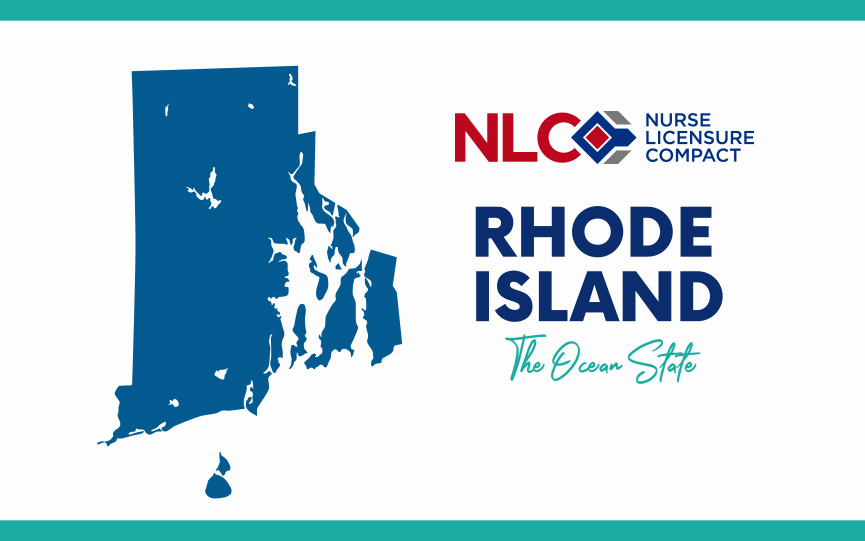CHICAGO – Gov. Daniel J. McKee signed the NLC into law on June 24, 2023, making Rhode Island the 41st jurisdiction to enact the NLC. The compact allows registered nurses (RNs) and licensed practical/vocational nurses (LPN/VNs) to have one multistate license, with the ability to practice in person or via telehealth, in both their home territory/state and other NLC states.
Sen. Joshua Miller, one of the NLC bill sponsors remarked, “Our state is grappling with a severe shortage of nurses. Returning to the compact is a way we can make it easier and more appealing for nurses to come here for a job, making it easier for our hospitals and health facilities to fill their staffing needs. Rejoining the compact is good for our public health and safety.”
Licensure requirements are aligned in NLC states, so all nurses applying for a multistate license are required to meet those same standards, including submission to a federal and state fingerprint-based criminal background check.
Although the NLC has been enacted in Rhode Island, an implementation process must be completed before its residents will be able to apply for a multistate license, and before nurses in other NLC states who hold a multistate license will be able to practice there. The implementation date has not been set.
With the multistate license, nurses are able to provide telehealth nursing services to patients located in NLC states without having to obtain additional licenses. A multistate license facilitates cross-border practice for many types of nurses who routinely practice with patients in other states, including primary care nurses, case managers, transport nurses, school and hospice nurses and many others. Further, military spouses who experience moves every few years also benefit greatly from the multistate license.
For more information, contact nursecompact@ncsbn.org or visit nursecompact.com.
About the Interstate Commission of Nurse Licensure Compact Administrators (ICNLCA)
The ICNLCA facilitates cross border nursing practice through the implementation of the nationally recognized, multistate license, the NLC. The ICNLCA enhances nurse mobility and public protection through maintaining uniform licensure standards among party state boards of nursing; promoting cooperation and collaboration between party states, facilitating the exchange of data and information between party states; and educating stakeholders. The ICNLCA is a quasi-governmental and joint public agency of the party states created and established on July 20, 2017. The Executive Committee is the seven-member elected leadership of the ICNLCA.
About the NLC
The NLC allows for RNs and LPN/VNs to have one multistate license, with the ability to practice in person or via telehealth in both their home state and other NLC states. There are 39 jurisdictions that are members of the NLC. Licensing standards are aligned in NLC states, so all nurses applying for a multistate license are required to meet the same standards, which include a federal and state criminal background check that will be conducted for all applicants for multistate licensure.
The NLC also enables nurses to provide telehealth nursing services to patients located across the country without having to obtain additional licenses. In the event of a disaster, nurses from multiple states can easily respond to supply vital services. Additionally, almost every nurse, including primary care nurses, case managers, transport nurses, school and hospice nurses, among many others, needs to routinely cross state boundaries to provide the public with access to nursing services, and a multistate license facilitates this process.
